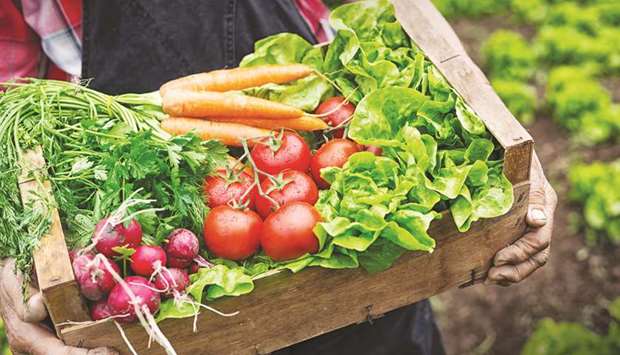
By Reem Abdulrahman Jassim al-Muftah
So what does ‘organic’ mean anyway? According to most international and governmental guidelines organic products are produced without synthetic pesticides, herbicides, fertiliser or sewage sludge. The farms or producers should not be genetically engineering or using ionizing radiation. When it comes to livestock, the animals have to be fed organic feed, live on organic land and be raised without antibiotics or growth hormones just like the produce. There are also several guidelines in terms of farm location, environment and the surroundings to be ‘organic.’ The main purpose and goals of going organic were to enhance soil and water quality, reduce pollution, provide safe and healthy livestock living conditions, support natural livestock behaviour and promote self-sustainability in terms of resources. A common misconception is that ‘free range’ also refers to organic products but it does not. It only means that the animals are not too limited in terms of space. People also confuse ‘natural’ with organic, although natural means that there is no artificial flavouring, colouring or preservatives.
So let’s answer the million-dollar question, is eating organic healthier? Well according to all the studies and in the eyes of the experts, there is still much confusion as all the studies show varying results. This is probably because the nutrient content of food depends on many factors including soil quality, weather conditions and the time of harvest. The composition of dairy products and meat are also affected by differences in animal genetics, breed, what they eat, the time of year and the type of farm. Therefore, there is not enough evidence to prove if eating organic is healthier or not, but according to studies, there are potential benefits that are yet to be proven but most likely beneficial such as the following:
1. slightly higher phosphorous levels
2. higher omega-3 fatty acid content in organic milk and chicken
3. 30% lower pesticide residues, although non-organic are still safely within the range
4. plants usually rely on chemical pesticides to protect themselves, but when none are used, they produce more of their own protective compounds called antioxidants, therefore there are potentially higher amounts in organic produce, but not enough to make that big of a difference in your health
In conclusion, organic foods may reduce your exposure to pesticides but the levels in non-organic food are well below the safety guidelines. So if you choose to go organic, always look for the organic authenticity by looking for a USDA organic seal or something similar or looking though the ingredients list. If you choose to go non-organic, always wash your produce extra well to reduce the amount of pesticide residues. If you are still not sure but are on a budget, below is a list of the highest ranked produce with the highest amounts of pesticide residue: strawberries, spinach, kale, nectarines, apples, grapes, peaches, cherries, pears, tomatoes, celery and potatoes. You could possibly opt to go organic for these items and go non-organic for the least pesticide contaminated produce including: avocados, sweet corn, pineapples, onions, papaya, sweet peas, eggplants, asparagus, cauliflower, cantaloupe, broccoli, mushrooms, cabbage, honeydew melon and kiwi.
* The author is a wellness advocate and influencer @keys2balance.

